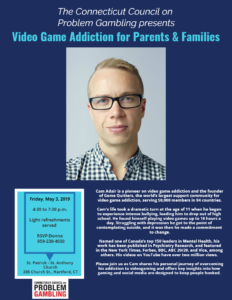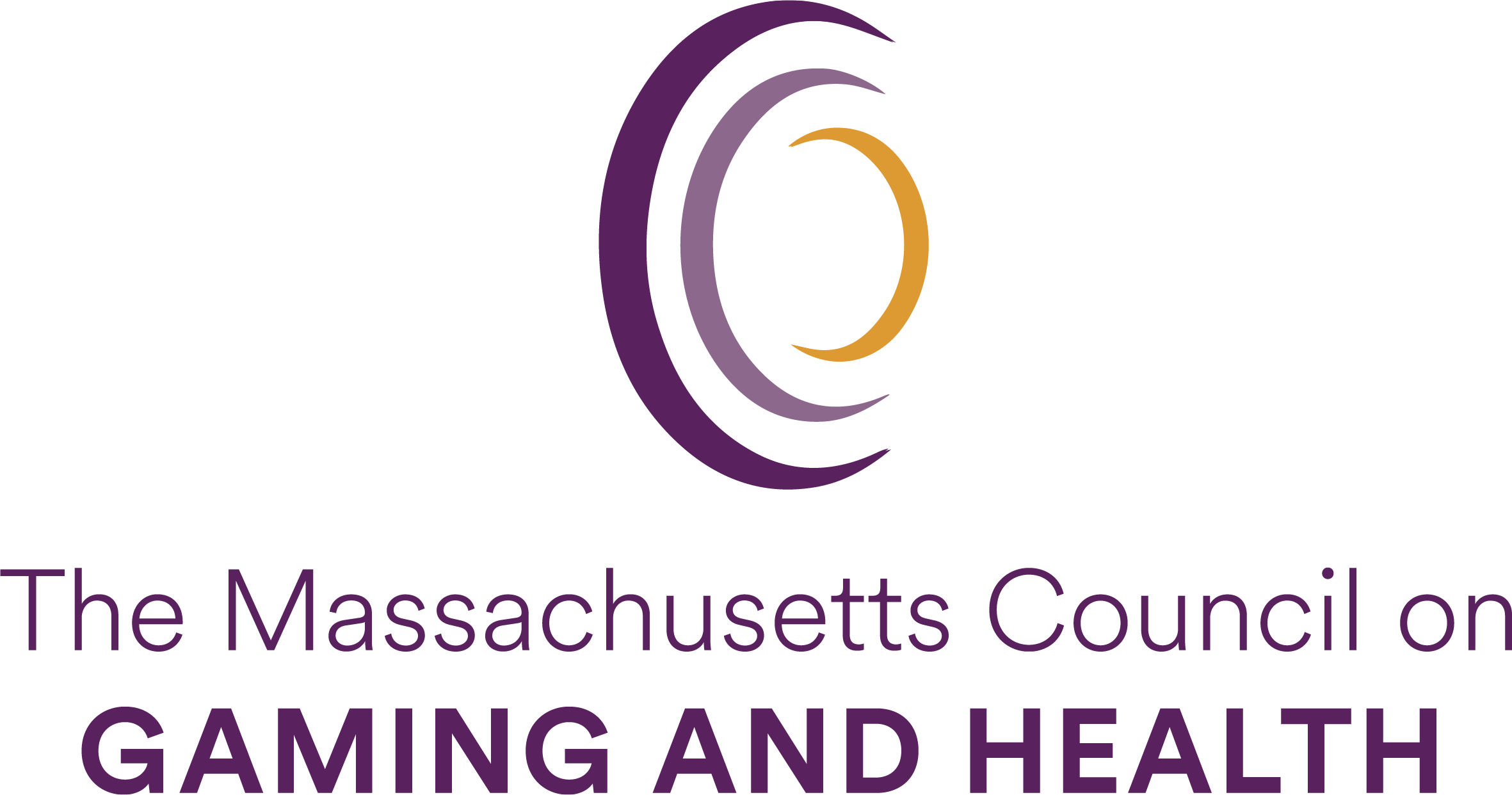Brockton, MA —
Thank you for attending the training! Resources are below. Please feel free to reach out anytime to Julie Hynes (julie@maccg.org).
Partner alert: Yale’s Dr. Marc Potenza will be on “ScreenTime: Diane Sawyer Reporting” on Friday, 5/3 at 8PM.
Partner alert: FREE event on May 3, 2019– Video Game Addiction for Parents & Families with Cam Adair

Slide Deck:
(Please excuse any formatting issues related to content upload.)
[pdf-embedder url=”https://macgh.org/wp-content/uploads/2019/03/Blurring-Lines-Youth-Gaming-Gambling-2019-05_MCCG-AM.pdf”]
<br clear=”all/>
[pdf-embedder url=”https://macgh.org/wp-content/uploads/2019/03/Blurring-Lines-Youth-Gaming-Gambling-2019-05_MCCG-1.pdf”]
Description: The world of what we have considered “gambling” has shifted dramatically in recent years. In this training, participants will gain an understanding of recent and emerging trends in gaming and how these trends have blurred the lines between how we have defined gaming and gambling. We will have a special focus on online gaming, and participants will be able identify some practical tools and strategies for use in their professional and personal settings.
Learning Objectives:
At the end of the training, participants will be able to:
- Describe at least three recent trends in youth video gaming and gambling;
- Identify risk and protective factors, as well as specific youth vulnerable populations for problem “gaming” and gambling;
- Describe three methods of addressing problematic gaming and gambling in their work.
Julie Hynes has over 17 years of experience in addictions prevention and program coordination. Her passions include community education, leadership development, media and public policy. Julie has served on the Board of Directors of the National Council on Problem Gambling and is a member of the Council’s prevention committee. She regularly provides training and technical assistance on prevention and problem gambling across the United States and is a past recipient of Wuelfing Prevention Award from the National Council on Problem Gambling.
References:
Assael, S. (2017, January). Skin in the game: Counter-Strike has spawned a wild multibillion-dollar world of online casino gambling; it’s barely regulated and open to any kid who wants in. ESPN. Retrieved from http://www.espn.com/espn/feature/story/_/id/18510975/how-counter-strike-turned-teenager-compulsive-gambler
Bányai, F., Griffiths, M., Király, O., Demetrovics, Z. (2018). The psychology of esports: A systematic literature review. Journal of Gambling Studies. https://doi.org/10.1007/s10899-018-9763-1
Carey, B. (2018, July.) Endless gaming may be a bad habit. that doesn’t make it a mental illness. New York Times. Retrieved from https://www.nytimes.com/2018/07/02/health/internet-gaming-addiction.html
Fauth-Büler, M., Mann, K. (2015, Nov.) Neurobiological correlates of internet gaming disorder: Similarities to pathological gambling. Journal of Addictive Behaviors doi: 10.1016/j.addbeh.2015.11.004
Fung, B. (2018, November). U.S. consumer watchdog to investigate video games loot boxes. Washington Post. Retrieved from https://www.washingtonpost.com/technology/2018/11/28/us-consumer-watchdog-investigate-video-game-loot-boxes/?utm_term=.23f7f1e1c00e
Gainsbury, S., Abarbanel, B., & Blaszczynski, A. (2017). Intensity and gambling harms: Exploring breadth of gambling involvement among esports bettors. Gaming Law Review, 21(8), 610-615. https://doi.org/10.1089/glr2.2017.21813
Gainsbury, S., Russell, A., King, D., Delfabbro, P., & Hing, N. (2016). Migration from social casino games to gambling: Motivations and characteristics of gamers who gamble. Computers in Human Behavior, 63, 59-67.
Gainsbury, S. Russell, A., & Hing, N. (2014). an investigation of social casino gaming among land-based and internet gamblers: A comparison of socio-demographic characteristics, gambling and co-morbidities. Computers in Human Behavior, 33, 126–35. doi:10.1016/j.chb.2014.01.031.
Gainsbury, S. M., Hing, N., Delfabbro, P. H., & King, D. L. (2014). A taxonomy of gambling and casino games via social media and online technologies. International Gambling Studies,14, 196–213. https://doi.org/10.1080/14459795.2014.890634
Jacques, C., Fortin-Guichard, D., Bergeron, P., Boudreault, C., Levesque, D., Giroux, I. (2016). Gambling content in Facebook games: A common phenomenon? Computers in Human Behavior, 57, 48-53.
King, D., Delfabbro, P., & Griffiths, M. (2010). The role of structural characteristics in problem video game playing: A review. Cyberpsychology: Journal of Psychosocial Research on Cyberspace, 4, 1. Retrieved from https://cyberpsychology.eu/article/view/4229/3272
Kuss, D.J. & Griffiths, M.D. (2012). Online gaming addiction in children and adolescents: A review of empirical research. Journal of Behavioral Addictions, 1, 3-22. Retrieved from https://doi.org/10.1556/JBA.1.2012.1.1
Petry, N., Rebhein, F., Gentile, D.A. Lemmins, J.S., Rumpf, H.J. (2014). An international consensus for assessing internet gaming disorder using the new DSM-5 approach. http://dx.doi.org/10.1111/add.12457
Rose, I.N. (2006). Gambling and the law: An introduction to the law of internet gambling. UNLV Gaming Research & Review Journal, 10, 1-14.
Throuvala, M., Janikian, M., Griffiths, M., Rennoldson, M., & Kuss, D.(2019, in press). The role of family and personality traits in Internet gaming disorder: A mediation model combining cognitive and attachment perspectives. Journal of Behavioral Addictions. https://doi.org/10.1556/2006.8.2019.05
Wohl, M. J. A., Salmon, M. M., Hollingshead, S. J., & Kim, H. S. (2017). An examination of the relationship between social casino gaming and gambling: The bad, the ugly, and the good. Journal of Gambling Issues, 35, 1–23. https://doi.org/10.4309/jgi.2017.35.11
World Health Organization. (2018). International Classification of Diseases 11th edition (ICD-11). http://www.who.int/features/qa/gaming-disorder/en/
Zendle D, Cairns P (2018) Video game loot boxes are linked to problem gambling: Results of a large-scale survey. PLoS ONE 13(11): e0206767. https://doi.org/10.1371/journal.pone.0206767

